by Nicholas Reading & Jennifer Merrifield
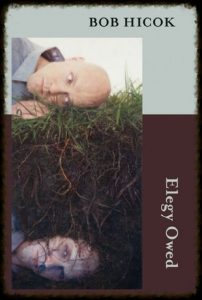 Bob Hicok’s seventh collection is Elegy Owed (Copper Canyon, 2013). This Clumsy Living (University of Pittsburgh Press, 2007), was awarded the 2008 Bobbitt Prize from the Library of Congress and published in a German translation by Luxbooks in 2013. A recipient of six Pushcart Prizes, a Guggenheim and two NEA Fellowships, his poetry has been selected for inclusion in eight volumes of Best American Poetry.
Bob Hicok’s seventh collection is Elegy Owed (Copper Canyon, 2013). This Clumsy Living (University of Pittsburgh Press, 2007), was awarded the 2008 Bobbitt Prize from the Library of Congress and published in a German translation by Luxbooks in 2013. A recipient of six Pushcart Prizes, a Guggenheim and two NEA Fellowships, his poetry has been selected for inclusion in eight volumes of Best American Poetry.
Hicok says, “We are the mouths of the world, and through poetry we speak.” What makes Hicok so valuable is that his message encourages the reader to take careful note of the mundane without losing sense of its comedy, and without losing sense of its tragedy. Hicok’s poems synthesize these elements shedding new light on familiar experiences.
NR: This is Nicholas Reading and I’m here with Jennifer Merrifield speaking with Bob Hicok. Bob, thank you for joining us today.
I’m happy to be here.
JM: You have said that when you began writing poetry around 20 or so, you were reading novels at the time. How did those narratives affect your poetry, and what drew you to poetry in the first place? Did the environment of Ann Arbor help?
Ann Arbor ended up helping in a lot of ways because I came across open mikes there and then poetry slams. The second poetry slam in the country was started in Ann Arbor, and that was really my introduction to poetry in any kind of public context. Novels, I think at least initially, were very helpful to me because my early work was pretty much all narrative. Even novels that are either experimental or work that’s considered off the beaten path still has a narrative drive. Exposure to story, in that context, when I started writing poetry carried over very neatly. I started trying to write song lyrics. I had no intention of writing poetry. I didn’t know much about poetry; I wanted to write songs, but the problem was I didn’t play an instrument and had no sense of music, so I ended up writing really crappy, rhymed song lyrics that ended up too complicated to be songs. I think the fact that I didn’t have a sense of how to minimize what I was doing ended up scooting me into something that became poetry. Song lyrics, by and large, have to be, I think, very sparse, even when they are narrative in nature, and I didn’t seem to have that in me. I’d like to try again, but that was the basic progression.
JM: When you published, Legend of Light, you were an automotive die designer and computer system administrator. What was your writing life like then, and how did you balance your job and your writing?
I tended to write on weekends and after work. The balance was difficult to work out. There just wasn’t a lot of time to write. But fortunately, I’ve had a lot of energy. Less as I get older, as one would expect. I was able to do both, but what I had to do to achieve that was to give up a lot of stuff. People would be going out to dinner or a movie or something, and I would have to say, “No, I can’t. I want to write.” If I were not able to do that, I don’t think I would’ve ever lasted. It really took cutting off a good chunk of my social life to achieve that. There was just no other time. So it was going to work, coming home, writing, a little bit of going out. And then when I got involved with Eve, fortunately, she had no trouble once she understood that I did need to go into a room alone and do this; it was fine. But mainly through effort.
NR: Certainly humor is an operative element in your own work, and what I’ve noticed is that your use of humor is in fact serious business as opposed to any kind of cheap laugh. Could you talk about that employment and how it has developed in your own work?
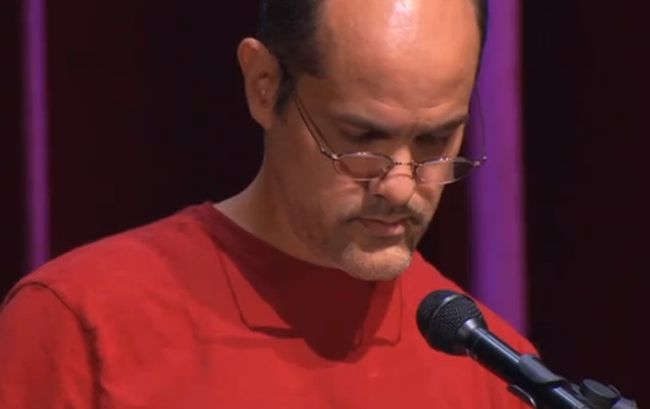
Hicok reading on PBS as part of the Poetry Everywhere project.
One of the things that I am uncomfortable with as of late is that some people are looking at me as a funny poet, and I think that can pretty much be the death of a career. We don’t, for whatever reason, seem to take humor in poetry that seriously. I was very happy when I was able to get my sense of humor into my poems. I had wanted it to show up, but it just didn’t. It wasn’t happening naturally, and at one point, I think when I started moving away from narrative, from straightforward narrative, and when I let the poems become a bit stranger, when I let them have these moments, primarily of surrealism, I’d be going through a narrative and all of a sudden something that just couldn’t happen would happen. And it was by doing that that my humor started showing up too. I think it’s because my humor will pop out at any moment. There could be nothing going on, it could be a very important moment, at the hospital or something, and my dad is having surgery, and it shows up. It’s never meant to deflect. For whatever reason, I seem able to say something that either I think is funny or people find funny without turning away from whatever else is going on. One of the difficult things for me in seeing how people respond to humor in poems is that they don’t seem to be able to respond to humor in poems. If you make a joke, it usually stops the conversation, and that’s not my intention at all. But it’s still unclear for me why people find certain things funny. And they’ll be things that I don’t intend to be funny; it’s just that this is what occurs to me in the moment and it’s more interesting than funny. But people will find it humorous, and it’s mystifying to sort some of that out. That was a really crappy answer.
NR: Nonetheless, your poem, “Poet/Stalker” comes to mind and I’m struck not only be the humor, but that poignant line when the speaker says, “all I’ve ever asked of my poetry is that it make someone cry.” How much of this statement is tongue-in-cheek, and how much of it is sincere?
It’s half and half, absolutely. And no, I don’t mean that absolutely that’s what I want, but I think that’s what a lot of people want. Not necessarily crying, that’s only 25% of it. But I still feel that one of the best things that you can do is move someone. You usually realize that most at readings because that’s the time when people will come up and say something, otherwise you might get a letter or email or something. But that idea I really like; that we can reach inside each other’s heads and effect some kind of realization, or nudge a memory in the right way that may take people back or makes them see something in a different way. But it’s also a tendency that can be so overdone in poetry. Many of us can push too hard at narrative and lyric poetry, be overly emotive. There’s that whole issue of sentimentality for American poets: it’s okay to be sentimental – somewhat. But sentimentality, we must avoid that. No one seems to have a clear sense of where that divide is. It’s a sensible divide, but what I think a lot of folks have done is to avoid sentimentality, and have moved away from any emotion at all. If this is dangerous, we will simply avoid it. I still like the idea of being able to move people. That poem was interesting, too, to realize that it is probably more dangerous for someone to tell a poet that they really like their work. The attachment is more likely to turn around given how little attention most of us get and how much attention we seem to want.
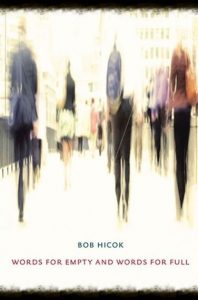 JM: Your poetry has also been described as surreal, but while you’ve acknowledged the surreal characteristics in some of your poems, you’ve also said that it is not the way you see your work. How do you feel about the surreal, and what do you think its purpose is in your poems?
JM: Your poetry has also been described as surreal, but while you’ve acknowledged the surreal characteristics in some of your poems, you’ve also said that it is not the way you see your work. How do you feel about the surreal, and what do you think its purpose is in your poems?
What surrealism is may be one of the hardest things to define, and probably should be one of the hardest things to define. If it encountered its own definition there would be a way that it would want to destroy it, or eat it. I’ve found myself in the last year or two really looking at narrative, lyric and surreal poetry with students in an effort to get them to first determine what the intentions of the poem are before they start talking about it, before they start critiquing it. I’ve asked them to look at those three chunks or ranges of the spectrum of what we do. And there was some point this year when I realized that the motion from narrative to surreal is a very simple thing. It primarily has to do with figurative language. By and large you are becoming far more figurative as you go along. Narrative poets tend to have very little figurative language, lyric poets a fair amount; surreal poets either will have a lot of figurative language or the work itself is fundamentally figurative. It’s an act of the imagination, which hopefully, in this sort of accretion of details or symbols or metaphors creates more of a mood, which you probably can’t articulate, but you’re sure that you feel a certain way because of the poem. You may not know exactly how. That’s the primary interest I have in it. And I like being able to get that into my work, either in the entirety of a poem or to have these moments where the poem just gives up on any concern that the reader will understand logically why these words are there, but that you might get something out of the image or the trope that does end up connecting either to a narrative or to the kind of lyric motion of the rest of the poem. I’ve been really confused over the years as to why people won’t avail themselves from the whole field of things that we can do, and I was happy to see this kind of thing showing up in my work at a certain point.
JM: How long was it before you noticed that showing up? And do you think there was something that you were reading or maybe something in your environment that triggered that?
It was boredom. There had been a number of times when I’ve sat down to write when, literally, I’m starting to move my hands toward the keyboard and I say, “Oh God, I know what you’re going to do. I know what I’m going to do.” Not exactly, but there was a period when I was writing persona poems and I knew, “You’re going to sit here and you’re going to imagine someone not yourself, probably in some kind of extreme situation.” And it was exhausting to think of doing the same thing. Somewhere between my first and second book, there was another kind of fatigue with narrative, and that’s when the work started to change. That may be the most significant change that I think I’ve gone through; primarily, I think, because the lyric and the surreal started entering the work to an extent that really hadn’t been there. I think it’s incredibly valuable to pay attention to fatigue. You sit down and your mind starts going in a certain direction and if you’re saying, “Not that again, no,” that if I know pretty much where I’m going, it’s probably your best indication that you should try something different.
NR: Thinking about your writing process, you’ve said that while some writers may think in terms of sound or color in the beginning stages of a poem, you think in terms of context or a unit of thought. Those situations then would occur to you as line breaks, etc., which would be your entrance into the poem. I wonder then how the rest of the poem is constructed, if it continues to appear to you or if there’s a point where it becomes more designed, more conscious in its progression?
One of my failings as a writer is that I’m almost wholly addicted to following. I don’t really know where my poems are going; I almost never know where they’re going. I was sending a message to someone the other day and I wrote that I had misspelled something, and then I wrote “I think I just misspelled misspelled.” I liked that idea and saw the beginning of a poem, but that’s it. That’s the only sense that I have. Of course, now that I’ve talked about it probably means I’ll never write that poem. But usually that’s what shows up for me, just some sense that I’m either interested in a line, or like recently, I wrote about a guy who works in a prison and he’s the executioner who doesn’t believe in capital punishment, and the way he gets around this is that he holds the hands of the guys as he’s injecting them with the drugs. I had no idea what I would write, but I knew as soon as I read it that I would write about it.
I wish in a lot of ways that I could plan poems out. A lot of people talk about walking around and they’re writing as they’re walking around, or they’ll build a sense of a poem over a period of time. And for me it’s so much about just sitting down and seeing what shows up. The first thing that shows up that has energy and catches my attention—I just start following where it’s going. I love that, but I also think there’s a limitation to that.
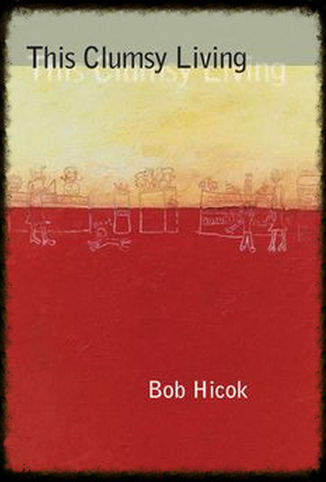 NR: With that limitation in mind—the idea of following and not knowing where it will end up—how do you know when you reached the end?
NR: With that limitation in mind—the idea of following and not knowing where it will end up—how do you know when you reached the end? I think that’s one of the hardest things to understand. I’ve come to believe that just like the tendency to form sentences, the tendency to want to work with stuff coming in and reshape it into language, that it’s primarily an instinct. I don’t know why, but I think I have always had an ability to finish poems. That’s not to speak to the quality of the endings. I don’t mean, “God, give me your poem and I’ll finish it for you.” But the notion of closure, not necessarily in the sense that it’s a poem that is going to have that kind of grand “And we all understood” closure, but I think I have an instinct for when something has completed itself, either when it’s exhausted or when I have arrived at something that is a natural culmination of what has gone on up to that point. I don’t know what that is. I don’t know how people end poems. That’s one of the few things so far that when it comes up, I basically say: no idea. We may not understand it, but you can push yourself to say the next thing. But finishing poems? No idea.
JM: Is there an aspect of your poetry that you feel has been overlooked by recent attention to your work?
My punctuation is really, really good, I think. No . . . that’s tricky. I’m very grateful for the attention my work has received. The reviews of my work have almost all been very positive. There was someone who wrote a review—I don’t know if it was of a book or a number of books—but he questioned the juxtaposition of certain socioeconomic facts and states of mind. In particular, that working class people would be readers to the extent that some of these characters would be articulating the things that they are, and he said something about me intruding on the poems to demonstrate what I know. And that is surprising to me – disappointing not so much in terms of my work, but to believe that people could think that you can’t put the two together. If people have that kind of notion, that the categories we are put in or put ourselves in are real . . . that’s really frightening to me. If that’s a mindset that is applied to my work, or will be applied to it, then I’m concerned and uncomfortable with that.
NR: Is the review, in your eyes, accurate? Or is it an indication of the division between white collar and blue collar? Low culture and high culture? The Colts and Rodin?
Is it accurate that by and large working class folks aren’t going to be reading a lot? Yes, by and large I think it is. The tricky thing is about most stereotypes is that a lot of it is true. That being said, there are all kinds of people. You have nurses, you have welders, shipbuilders who are well educated or come home and read the same kind of books that you or I might read. To deny that possibility is what is most confusing to me. In particular, the fact that I know what has come together in my body and my life. My parents are upper middle class folks. They’re pretty much first generation in their respective families to have that kind of money. About half of my family, they don’t read. The rest of us have gone to school. I do what I do. I’ve had a lot of jobs, but it was always understood that I was probably going to college. My parents were great. They told me, “You can do anything you want.” I never had any expectations that I was going to be a clock puncher, per se. But I’ve had part of my life in that world and part of my life in the academic world in one way or another for a long time. I’ve had a good chunk of my life in the professional world for many years, and you see that, yes, there is a type in each of those areas, but there are always crossovers, there are always individuals. The individual is always going to surprise you. Once you step away from the individual, the group is far less surprising, but the individual will astound you. To look at a particular poetry that way, to say that we can’t reflect this complexity, that we have to reflect the expectation of things being boxed off, is really disappointing. Poetry should be the most open form. We should be trying to get everything in there that we possibly can. To talk about it this long sounds like a grudge, and I think a lot of writers end up having that with reviewers, but it’s not that all. It’s just that one instance. But it’s been the most surprising for me to encounter so far.
NR: One of the things that strikes me about your work is that you are able to bring in diverse elements, especially when you deal with working class themes, and that it does truly seem altruistic. How do you go about writing about these individuals without co-opting their experiences?
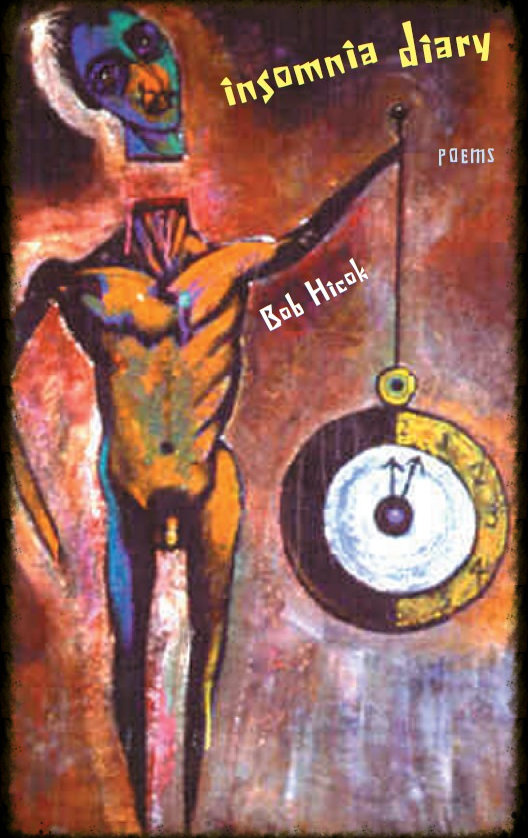 I don’t know that I haven’t done that. It could very well be the case that I have. I feel very comfortable writing about working class folks because I have had so many jobs. At one point I counted them up and had about thirty-five, a lot of them in factories. And even though I knew I was a visitor in those worlds, I was also participating in them. It’s also the legacy that exists in my family. During the Depression, my father’s father, my grandfather, would hitch-hike across Michigan on the expectation, on the hope, that there would be work on the other end. My dad, I can’t remember when he started working, he was very young, and it wasn’t like when I was very young and started working. That was for money to get candy. It was for money to buy a bike. My dad had to work. He would not only work, he would trap and hunt. It wasn’t for the sport of it. He needed the pelts to sell the pelts and they needed the food. So I feel close enough to that stuff that I feel that I can write about it genuinely. I think that every time that you take on a life that isn’t yours, you are dealing with persona, and you are always caught. The things you want to say are your things, they’re not that person’s, because in a sense that person doesn’t exist. Even if it’s my father or my grandfather, it’s someone I’m taking on. I’m adopting aspects of their life or trying to speak for them, but the things the writer wants to say will always show up. I think the hope is that what you want to say coincides enough with what these people probably would say, or would like to have said about them, for them. Also, critically, that’s another thing: if you write a lot about any group and you’re not at some point critical of them, then it stinks.
I don’t know that I haven’t done that. It could very well be the case that I have. I feel very comfortable writing about working class folks because I have had so many jobs. At one point I counted them up and had about thirty-five, a lot of them in factories. And even though I knew I was a visitor in those worlds, I was also participating in them. It’s also the legacy that exists in my family. During the Depression, my father’s father, my grandfather, would hitch-hike across Michigan on the expectation, on the hope, that there would be work on the other end. My dad, I can’t remember when he started working, he was very young, and it wasn’t like when I was very young and started working. That was for money to get candy. It was for money to buy a bike. My dad had to work. He would not only work, he would trap and hunt. It wasn’t for the sport of it. He needed the pelts to sell the pelts and they needed the food. So I feel close enough to that stuff that I feel that I can write about it genuinely. I think that every time that you take on a life that isn’t yours, you are dealing with persona, and you are always caught. The things you want to say are your things, they’re not that person’s, because in a sense that person doesn’t exist. Even if it’s my father or my grandfather, it’s someone I’m taking on. I’m adopting aspects of their life or trying to speak for them, but the things the writer wants to say will always show up. I think the hope is that what you want to say coincides enough with what these people probably would say, or would like to have said about them, for them. Also, critically, that’s another thing: if you write a lot about any group and you’re not at some point critical of them, then it stinks.JM: If you were to start your autobiography today, what would the first sentence be?
He is a vain motherfucker.
NR: That’s very nice.
That would be the last sentence too.
Notes on Hicok’s interview hosts Nicholas Reading and Jennifer Merrifield:
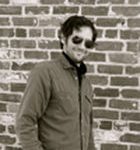
 Jennifer Merrifield is the author of American Proper and the Managing Editor of Backbone Mountain Review. A featured emerging writer in Natural Bridge, her poetry received the Columbia Poetry Prize, the 42opus Editor’s Select Prize, and has appeared in dozens of journals and anthologies. An Assistant Professor of English at Potomac State College of WVU, she lives in Frostburg, Maryland.
Jennifer Merrifield is the author of American Proper and the Managing Editor of Backbone Mountain Review. A featured emerging writer in Natural Bridge, her poetry received the Columbia Poetry Prize, the 42opus Editor’s Select Prize, and has appeared in dozens of journals and anthologies. An Assistant Professor of English at Potomac State College of WVU, she lives in Frostburg, Maryland.
